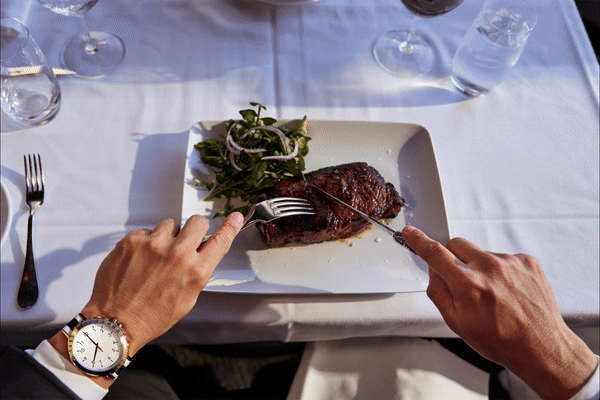NYC restaurants say hottest reservations at at 7 p.m.

It’s the hour that ate the Big Apple’s restaurants.
When the pandemic ended and New Yorkers finally returned to full-capacity dining, they started and finished earlier due to work-from-home and an aversion to late hours after months of “sheltering in place.”
Now, three years later, Gothamites are still opting to eat, on average, at least an hour earlier than they did in 2019, according to more than a dozen restaurant owners and operators who spoke with The Post.
“They’re reserving as early as 5:30 and 6 p.m. is a hot time,” said Michael Lomonaco, the founding chef of Porter House Bar & Grill (previously called Porter House NY) at Columbus Circle.
“The after-nines are much rarer than they were,” added Lomonaco, now a consultant to the restaurant. “People are dining earlier consistently. We rarely saw customers between 5 and 6 before the pandemic.”
Blocks where restaurants cluster, such as on Second Avenue between East 77th and 78th streets and in the Lower East Side’s bar-saturated “Hell Zone,” are less rowdy than they used to be after 9 p.m.
The trend is apparent at both fining dining institutions and more casual spots. Sebastian Silvestri, the CEO of Daniel Boulud’s Dinex Group, says they’ve seen a demand for earlier times at all of their restaurants, from flagship Restaurant Daniel on East 65th Street to the Le Gratin bistro on Beekman Street downtown.
“Everyone who calls wants a 7 or 7:30 table,” Silvestri told The Post. “Before the pandemic there was much more demand for tables between 8 and 8:30 … We do the same volume of business but it starts earlier and ends earlier.”
The new hours are even true at late-night favorites.
At Pastis and Buddakan, “The last reservations are in at 10,” according to restaurateur Stephen Starr.
That sounds late — except that 11 p.m. was the old norm.
At Indochine on Lafayette Street, many revelers enjoy Vietnamese ravioli and Cambodian amok an hour earlier than they once did.
“Thank God for the Europeans and South Americans who still want dinner from 9:30 or 10,” chuckled owner Jean-Luc Hommard.
Even Happy Hour has moved back.
The popular $1 oyster deals at Crave Fishbar that were once from 5 to 7 p.m. are now from 4 to 6 p.m.
Everyone has a different explanation for the phenomenon.
Avra Group chief Nick Nikolopoulos said, “Many people moved out of the city and they take longer commutes.”
Penny Glazier, an owner of Morgan’s Brooklyn Barbecue and Tiny’s Cantina near the Barclays Center, thinks months of near-isolation during lockdowns simply changed people’s habits.
Other cite work-from-home.
New York City Hospitality Alliance executive director Andrew Rigie noted, “People who work remotely have more flexibility than compared with working in the office. Many people seem to just be having earlier evenings in general since the pandemic.”
The new schedules seem to apply not just for dining in, but also to takeout and delivery. GrubHub, the leading restaurant delivery service, reports its “busiest time for ordering now is between 5 and 7 p.m., compared to 6 to 8 p.m. prior to the pandemic,” said company spokesperson Jenna DeMarco.
The new start-and-finish times make dining experiences worse in some ways. Servers who begin at 3 p.m. to accommodate the early dinner rush might sign off at 9 p.m. — in the middle of some diners’ meals.
“I’m leaving and my colleague so-and-so will be taking care of you,” they announce abruptly at various restaurants, breaking the meal’s continuity and their connection with the customer.
But eating earlier does have its advantages.
After a friend arrived 45 minutes late for dinner at the fine new Bourbon Steak on Central Park South, I enjoyed bone-in ribeye, crab-stuffed soft-shell crab and red Burgundy wine without regard to the clock. I finished dinner around 10:30 p.m. instead of my usual 8:30 or 9 p.m.
When I conked out around midnight, I woke up a half hour later with a growling stomach and heartburn.
Heather Hodson, a registered dietician at NYU Langone Healthy, said she recommends patients leave three hours between the end of dinner and bedtime “to optimize digestion.”
“It helps to reduce gurd and reflux,” she said.
Whether or not the early bird gets the worm — or a better dining experience — is debatable, but he definitely gets a better nights sleep.




